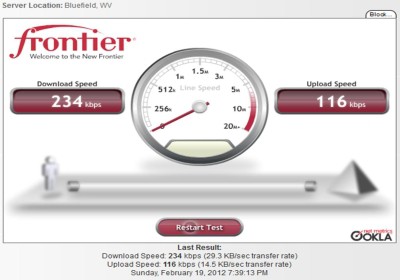
The best way Frontier Communications believes it can resolve service problems in Pennsylvania is to threaten those complaining with a cease and desist letter that accuses the complainant of misrepresenting Frontier’s excellent service.
Bradford County, Pa. officials learned this first hand when Commissioner Darryl Miller wrote to Frontier alerting them that service outages in northeastern Pennsylvania are becoming a public safety issue. The company responded with a letter warning the commissioner to end the criticism or else.
“We’re simply looking for answers,” Commissioner Miller told WNEP-TV’s investigations reporter Dave Bohman. Miller adds he thinks it’s heavy-handed to use the words, “cease and desist.”
Miller isn’t the only one looking for answers. WNEP interviewed Susan Moore, who lives alone in the rural community of Orwell. Her phone service went out of service at least once a week over the summer.
“I’ve got a lot of health issues,” she told the TV station. The implications of not having landline service became all too clear to Moore in August when she needed to send for an ambulance.

Bradford County, Pa.
Moore pressed her lifeline call alert button which relies on Frontier phone service to reach medical aid in case she falls and cannot get up or has a medical emergency. Nothing happened. Her phone service was out again.
“Without the phone service, my Life Alert doesn’t work,” Moore said. “That’s when I decided, as much pain as I was in, I got in a car and drove 20 miles to get to a hospital.”
Bradford County officials hear stories like Moore’s so often, they now eclipse complaints about potholes and taxes.
The problems affect both traditional landline dial tone service and DSL. If outages are not the subject of the complaint, slow and unresponsive Internet access usually is. Some customers were told Frontier oversold its DSL service in Bradford County and the company is waiting for federal broadband subsidies to improve service in the area.
Frontier Communications vice president Elena Kilpatrick said Frontier will spend part of a $2 million broadband improvement subsidy to deliver better service in Bradford County over the next six years. At the same time Frontier is tapping a ratepayer-funded subsidy to improve its existing service, the company is spending $10.5 billion of its own money to acquire Verizon landline infrastructure and customers in Florida, Texas, and California.
Despite the fact it will take up to six years to fully spend the subsidy, Kilpatrick claims the company has already upgraded phone and Internet service and fixed several problems reported by customers. She defended the company’s use of a threatening “cease and desist” letter sent to Commissioner Miller, claiming Frontier wanted the “misrepresentation of the facts” to stop.
Despite Kilpatrick’s claims, the complaints keep rolling in.
Randy, a Frontier customer in Bradford County reports he endures Frontier outages just about every Saturday since October, despite repeated service calls. Janise Groover wrote a Frontier technician tried to blame cobwebs for interfering with her Wi-Fi signals and poor DSL speeds — problems that are still unresolved — for which she pays Frontier $103 a month. Janice Bellinger complained her Frontier DSL connection drops “three or four times a day.” Customers in Monroe, Luzerne and Sullivan counties echoed Frontier service is dreadful in their areas as well.
Customers experiencing problems with their phone service in Pennsylvania can file an informal complaint with the state Public Utilities Commission and the FCC.
[flv]http://www.phillipdampier.com/video/WNEP Scranton Frontier Service Problems 11-16-15.mp4[/flv]
WNEP in Scranton reports Frontier’s solution to a county commissioner’s complaints about service was to send him a “cease and desist” letter. (3:16)


 Subscribe
Subscribe
 Much of the opposition to municipal broadband comes from Republican politicians on the state and federal level. Most claim municipal providers represent unfair competition to the private sector. The American Legislative Exchange Council (ALEC) considers municipal broadband a significant issue. The corporate-funded group offers state legislators the opportunity to meet with telecom company lobbyists. Legislators are also provided already-written sample legislation restricting municipal broadband developed by ALEC’s telecom company members, including AT&T, Comcast, and Time Warner Cable. In states where Republicans hold the majority in the state legislature, such bills often become law.
Much of the opposition to municipal broadband comes from Republican politicians on the state and federal level. Most claim municipal providers represent unfair competition to the private sector. The American Legislative Exchange Council (ALEC) considers municipal broadband a significant issue. The corporate-funded group offers state legislators the opportunity to meet with telecom company lobbyists. Legislators are also provided already-written sample legislation restricting municipal broadband developed by ALEC’s telecom company members, including AT&T, Comcast, and Time Warner Cable. In states where Republicans hold the majority in the state legislature, such bills often become law.
 Frontier Communications continues to face challenges keeping customers in its legacy copper wire service areas, where only modest investments in network upgrades have proved insufficient to stop customers shopping around for better service.
Frontier Communications continues to face challenges keeping customers in its legacy copper wire service areas, where only modest investments in network upgrades have proved insufficient to stop customers shopping around for better service. With one less significant competitor in the marketplace, AT&T feels safe cutting back customer promotions to raise prices and profitability, even if it means losing customers.
With one less significant competitor in the marketplace, AT&T feels safe cutting back customer promotions to raise prices and profitability, even if it means losing customers.
 “They don’t have television in these areas, or I should say we didn’t have a video offering,” Stephens said of AT&T’s rural customer base, mostly still dependent on DSL. With its ownership of a satellite TV provider, there is less urgency to expand rural U-verse. “These were generally out of the U-verse footprint, but now we do. And now we’ll be able to provide them with a video offering through DirecTV, and we’re very pleased with that. So we are hopeful that now this nationwide video service will help us in improving our overall broadband positioning.”
“They don’t have television in these areas, or I should say we didn’t have a video offering,” Stephens said of AT&T’s rural customer base, mostly still dependent on DSL. With its ownership of a satellite TV provider, there is less urgency to expand rural U-verse. “These were generally out of the U-verse footprint, but now we do. And now we’ll be able to provide them with a video offering through DirecTV, and we’re very pleased with that. So we are hopeful that now this nationwide video service will help us in improving our overall broadband positioning.” “I’m going to tell you, I think on the consumer side we’re down into the two million range on total DSL customers,” Stephens said. “[…] I would suggest to you it has changed dramatically over the course of four or five years, where it used to be 90% plus of our broadband base and now it’s a much lower percentage. So we’ve gone through that migration not completely, but almost completely.”
“I’m going to tell you, I think on the consumer side we’re down into the two million range on total DSL customers,” Stephens said. “[…] I would suggest to you it has changed dramatically over the course of four or five years, where it used to be 90% plus of our broadband base and now it’s a much lower percentage. So we’ve gone through that migration not completely, but almost completely.” Requiring Frontier Communications to increase broadband speeds could make the service unaffordable for rural and poor Americans, the company is arguing before federal and state regulators.
Requiring Frontier Communications to increase broadband speeds could make the service unaffordable for rural and poor Americans, the company is arguing before federal and state regulators. Frontier’s ability to deliver consistent 10Mbps service in rural areas is the issue.
Frontier’s ability to deliver consistent 10Mbps service in rural areas is the issue.
